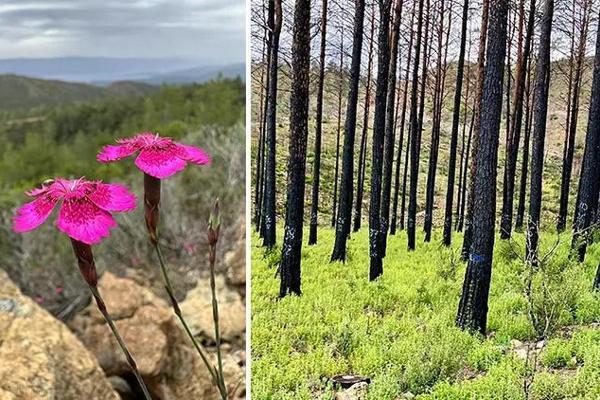Charred forest cover of Marmaris rejuvenating itself
MUĞLA


Around 4,392 hectares of forest cover that was reduced to ashes following massive wildfires in the southwestern province of Muğla’s Marmaris district last year is now turning green again with the help of an experimental method in which burned trees were not cut down but left to the natural cycle of the ecosystem.
An intense forest fire broke out in a forest in Marmaris on June 21, 2022, and due to the inability to carry out aerial intervention at night and the influence of the wind, it spread rapidly.
The largescale fire could only be extinguished by the end of the fifth day, ruining 4,392 hectares of forest land. The 34-year-old arsonist, Sacit Ayhan, was arrested on June 24, 2022, after he admitted that he started the fires out of rage as he was furious with his family members over land issues.
However, over the course of one year following the fire, nature has rejuvenated itself. The roots of the damaged red pine trees and the areas close to the settlements have turned green.
Academic Yasin İlemin from Muğla Sıtkı Kocaman University stated that they conveyed some restoration recommendations to the Agriculture and Forestry Ministry‘s General Directorate of Forestry immediately after the fire to restore the forest and biological diversity.
“It was crucial not to till the soil with heavy machinery, especially in the areas where the wildlife exists. We witnessed a rapid recovery of wildlife as a result.”
Pointing out that they implemented an experimental method based on the suggestion of Çağatay Tavşanoğlu, a faculty member at Hacettepe University and a fire ecologist, İlemin noted that in some areas, burned trees were not cut down and remained untouched for a year.
“With the results we have obtained, we have proved that it is our natural, ecological and fast technique that resulted in red pine saplings to sprout again. The main factor contributing to this success was the preservation of burned trees in the area, which provided partial protection for the emerging shoots, as the soil remained undisturbed,” İlemin said.
“With the implementation of this experimental technique, red pine seedlings began to grow again after one year.”
İlemin also stated his team plans to prepare an ecological restoration guide for post-fire scenarios.
“Our ecological restoration design guide will be prepared at the end of one year. I believe the best restoration method is to imitate nature.”
